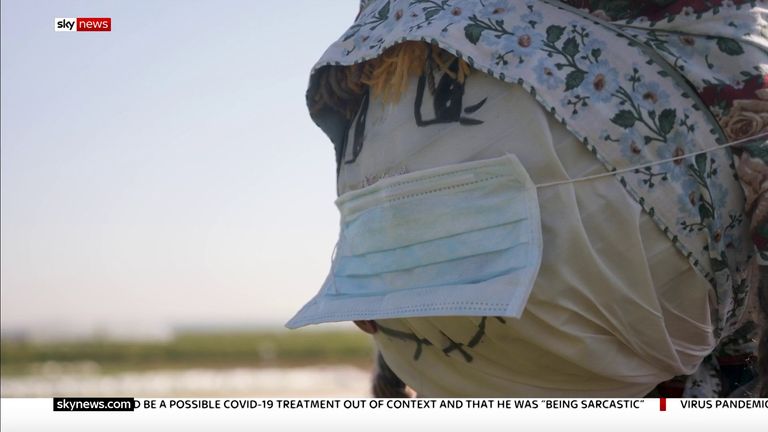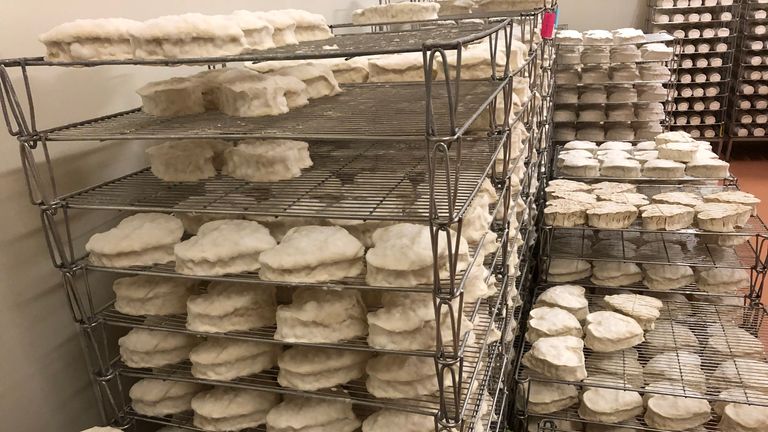Coronavirus: How the pandemic is ruining the European economy
Coronavirus has savaged farming, and it did so suddenly, leaving tens of thousands of people fearing for their future.
Saturday 25 April 2020 13:20, UK
As Pierre Villiers slides open a heavy door, it is the smell that hits you.
Inside the chilled room sit rack after rack of rapidly maturing cheeses. Many of them are cut into a heart shape - that is the tradition of Neufchatel. Others are prepared into circles, or squares.
All of them have that distinct strong smell. But the trouble is, it's too strong. They are going off, now too mature to sell to customers who, in the most part, have stopped buying cheese anyway.
In this single room, there is cheese worth more than €30,000 (£26,300), and it will all be thrown away. Next door is another €16,000 (£14,000) worth of stock facing the same dismal future.
Coronavirus has savaged farming, and it did so suddenly. Mr Villiers says the lockdown imposed by the French government caused a sudden and profound collapse in demand from restaurants and markets that were told to close.
He, like many others, was left with a load of stock and nowhere to sell it.
At the time, supermarkets were concentrating their attention on coping with panic buying, on finding supplies of toilet paper and pasta. Questions about cheese orders went unanswered. The products were left unsought.
He responded by stopping production of cheese for a while. More than 20,000 litre of milk - enough to supply a small village for a year - was simply tipped down the drain.
Only now has production started again, thanks to Mr Villiers's hope that his heart-shaped cheese will be seen by some as a fun treat to celebrate the end of the lockdown next month.
If the lockdown is extended, however, he may lose a lot more money.
This farm, in the sweeping fields of Normandy, has belonged to his family since 1850. Rarely, though, has it faced such pressure.
"The last time we were unable to sell on a similar level was during the Second World War, when the German occupation prevented open markets," he says.
"I've never seen it like this. The worst problem for us is the drop in consumption of cheese, combined with the closure of open markets, restaurants and caterers.
"All of this mean that in March we lost 70% of our sales. The cost to us in March was €30k (£26k), so a lot of cheese, and for April we still haven't done the sums, but the amount will be high."
This is the economic damage that is being done across farms in Europe. Some, like these small dairy farms, are especially vulnerable because their produce has such a short shelf-life.
Factories can store unsold steel bars or cars, for instance. But cheese just goes off.
:: Listen to the Daily podcast on Apple Podcasts, Google Podcasts, Spotify, Spreaker
It is the same story across so many businesses making perishable goods. We take a journey over the border to the Netherlands and visit Henk van der Slot.
You can't miss his farm. There are thousands upon thousands of tulips in his field, a mass of different colours and types. But the market in these flowers has also collapsed, with restaurants and florists closed. Weddings are being cancelled everywhere.
Instead, he is concentrating on selling bulbs around the world. But even there, the price has halved - dragged down by nervousness over the future.
"You're always thinking to yourself, 'Will it kill my company?'" said van der Slot, as we chatted in his giant greenhouse.
"I think I will be pushed backwards for a few years. I'll have to start again, but I'm not old enough to quit. The government will help us to get money from the bank, to cope with what's happening, but I'll have to pay that loan back.
"So the next time I need a tractor, or new equipment, I might not have the money to invest."
"Some companies are going to fall down, that's for sure," he says.
"You cannot compare this crisis to anything else. It's much, much worse."







